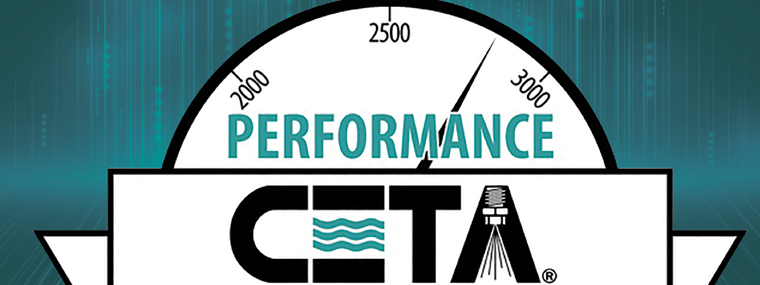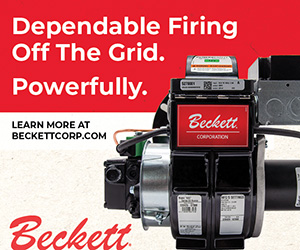
CETA Edge
CETA—Certified Distributor and CETA Performance Standard
By Diane M. Calabrese / Published June 2019

Assurance. In a word, it’s what equipment purchasers seek, and it is what the distributor, manufacturer, and supplier members of the Cleaning Equipment Trade Association (CETA) strive to provide.
When buyers of pressure washers and cleaning systems purchase machines and ancillaries, they want to be secure in the knowledge that the equipment has been thoroughly—and objectively—vetted. As an organization, CETA promotes and expects members to adhere to safety, environmental, and workmanship standards; so much so, that to add visibility to their unwavering commitment to excellence, more and more distributor members go the extra step and become a CETA-Certified Distributor. Similarly, the manufacturer members of the organization have moved forward with the development of the CPC-100 Performance Standard, which provides a uniform method for testing and rating pressure washers.
The CPC-100 standard focuses on the functioning of the final product. CETA members already have rigorous methods in place to ensure the processes used to make equipment meet exacting specifications, as well as standards for industrial production.
Certification and commitment to CPC-100 offer a highly visible way to demonstrate to equipment end users that those who sell the machine and those who made the machine are seriously engaged in the industry they serve. Paralleling the visibility is the equally important self-check that becoming certified and meeting CPC-100 provides.
“I think it is always good to have standards for participation in an industry group,” says Greg Sprunk, president of Superior Cleaning Equipment in Phoenix, AZ. “It just shows that you’re invested in what you do.”
Certified members also add strength to CETA. “CETA does a very good job of looking out for the whole—both in who they allow to participate on the manufacturer or dealer level and in looking at what is good for the group, not just the participant,” says Sprunk.
The effort it takes to become a CETA-certified distributor is generally equal to the effort that industry-immersed CETA members apply to their practices. Taking the time to formally demonstrate competencies makes sense.
“After getting involved in CETA, certification seemed to be the next logical thing to do,” says Sprunk. “And seeing how I was on the board and attending many of the functions and have also done a lot of training with Landa, Kärcher, and Water Maze that counted towards my certification, it was easier than I thought it would be.”
Certification also demonstrates a distributor’s engagement for the long-term. It is not something that one attains and then stops thinking about again. It is something to be attained and maintained.
“A CETA-Certified Distributor has invested in being the best and most informed,” says Ben Hagemann, general manager at American Pressure Inc. in Robbinsdale, MN. “This is a status that must be achieved through years of experience and continuing education.”
In short, things change. Keeping pace with change is a must.
“CETA-Certified Distributors are involved in the industry and are working hard to learn from the industry, stay on top of technology, and bring the most current information and best practices back to their business, which leads to a better-run business,” says Hagemann. “This has benefits for consumers and employees alike.”
Hagemann cites employees as beneficiaries. That’s a significant dimension of certification that sometimes gets too little mention.
To become certified, a distributor must document competencies among team members. It’s a good opportunity for team members and management to work together and share ideas and concerns. Process improvement, for example, can be a bonus of taking the time to complete certification.
“Simply put, we became a CETA-Certified Distributor to claim our place as one of the top pressure washer distributors,” says Hagemann. “Being part of an elite group that is dedicated to advancement is an honor, and it also lets our customers know that we take them and our industry seriously and only want to provide the best.”
CPC-100
There’s an old adage about little things, as in, they matter. In reality, everything matters, and little things have a way of adding up to a bigger whole.
The CPC-100 Performance Standard designation indicates to an end user that a pressure washer has met the specifications used to advertise it. (The standard encompasses portable, stationary, and fixed pressure washers with a hand supported or manipulated discharge line; it does not apply to propane-powered engines.) To be CETA CPC-100 certified, a pressure washer must meet four major criteria.
One, the actual pressure in the equipment must be at least 90 percent of the advertised pressure. Two, the measured flow must be at least 90 percent of the advertised flow. Three, if gas-engine powered, the engine must operate at 85 percent of its maximum capacity or less. Four, if the machine is powered by an electric motor, the motor shall not exceed the amperage on the name plate, including the service factor, while supplying plus or minus 10 percent of the name plate voltage.
Other criteria that must be met to obtain CETA CPC-100 include deviation allowances for nozzles, gauges, and testing accuracy. In addition to criteria to be met, the standard establishes how ratings for gpm and psi will be assessed.
To verify that the CETA CPC-100 standard is met, a manufacturer must submit all necessary documents and agreements directly to the CETA office for approval.
“The CETA performance standard shows a commitment to a uniform labeling and testing system,” says Hagemann. “There is an old standard, PC-100, that does a great job to describe horsepower requirements for design, and we still make use of those calculations for training and reference materials. The current performance standard, CPC-100, requires engine load testing as assurance the engine has available power and is being used correctly.”
With a uniform standard as a starting point, industry members also can be certain they are all talking about the same thing or have the same reference point. “The CETA standards help to develop uniformity and educate on performance and basic design of equipment,” says Hagemann.
Currently, Kärcher, Simpson and Delco (FNA Group), and BE (BE Pressure Supply) pressure washers meet the CETA CPC-100 standard. The robust roster of pressure washers that meet the CETA CPC-100 standard and the long list of CETA-certified distributors provide end users every opportunity to meet their equipment needs with an extra level of confidence.
End users should look at CETA certification and adherence to CETA CPC-100 as indicators of quality and professionalism. They should welcome knowing there was uniformity in testing the pressure washers they are comparing.
“Assure” derives from a Latin word for “secure.” When end users choose manufacturers who comply with CETA CPC-100 and distributors who are CETA certified, they tap into the fullest spectrum of security they possibly can.
For more about CETA CPC-100, see ceta.org/cpc-100-performance-standard. (The link to the CPC-100 description also provides a line-by-line comparison with the standard criteria used by the PWMA, or Pressure Washer Manufacturers’ Association, a non-profit group that dates to 1997.) For more about CETA-Certified Distributors, see ceta.org/distributor-certification or visit the CETA website (www.ceta.org) and use the pull-down tabs.





